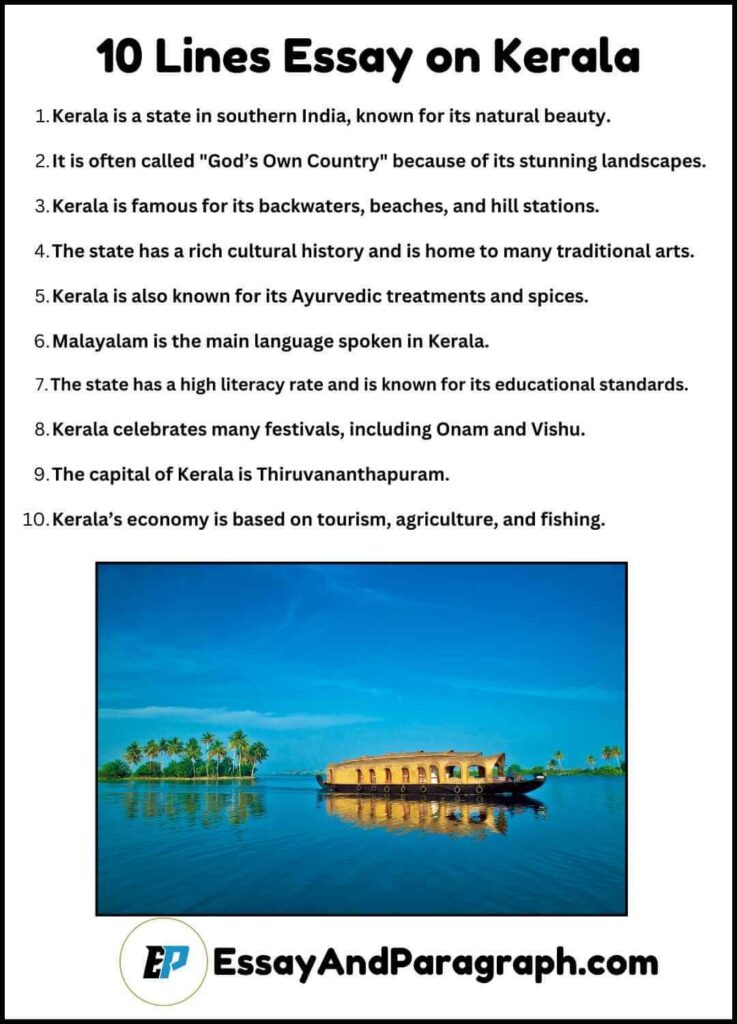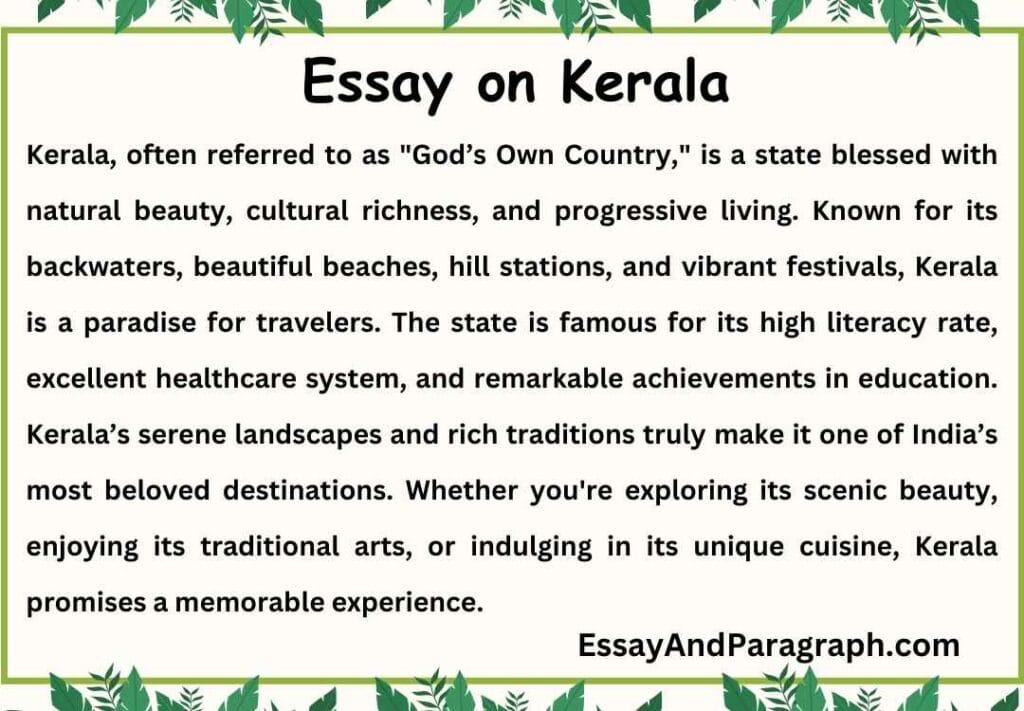Have you ever heard the phrase “God’s Own Country”? It’s often used to describe the beautiful state of Kerala, located in the southern part of India. Kerala is famous for its lush green landscapes, serene backwaters, and rich cultural heritage. It is a land of natural beauty, where the mountains meet the sea, and where traditions and modernity blend seamlessly. In this article, we will learn how to write an essay on Kerala, exploring its uniqueness, beauty, and significance as “God’s Own Country.”
10 Lines Essay on Kerala
- Kerala is a state in southern India, known for its natural beauty.
- It is often called “God’s Own Country” because of its stunning landscapes.
- Kerala is famous for its backwaters, beaches, and hill stations.
- The state has a rich cultural history and is home to many traditional arts.
- Kerala is also known for its Ayurvedic treatments and spices.
- Malayalam is the main language spoken in Kerala.
- The state has a high literacy rate and is known for its educational standards.
- Kerala celebrates many festivals, including Onam and Vishu.
- The capital of Kerala is Thiruvananthapuram.
- Kerala’s economy is based on tourism, agriculture, and fishing.

Short Essay on Kerala for Students
Kerala, often referred to as “God’s Own Country,” is a beautiful state located on the southwestern coast of India. Known for its backwaters, hill stations, and lush landscapes, Kerala is one of the most popular tourist destinations in India. The state is blessed with a unique climate, making it perfect for growing a variety of crops such as coconut, rice, and spices.
One of the main attractions of Kerala is its backwaters, especially in places like Alappuzha and Kumarakom. Tourists from around the world come to Kerala to experience houseboat cruises on these serene waters, surrounded by beautiful greenery. The state also boasts picturesque beaches such as Varkala and Kovalam, which are perfect for relaxation and water sports.
Kerala is rich in cultural heritage and traditions. It is famous for its classical dance forms, including Kathakali and Mohiniyattam. The state is also known for its traditional art forms like Theyyam, a performance art where dancers dress as gods and goddesses. Kerala’s festivals, such as Onam and Vishu, are celebrated with much fanfare and enthusiasm, making the state’s cultural fabric even more vibrant.
Another important aspect of Kerala is its high literacy rate and excellent healthcare system. Kerala is often cited as one of the most progressive states in India, with impressive human development indicators. The state has a thriving economy based on tourism, agriculture, and fishing.
In conclusion, Kerala truly lives up to its name as “God’s Own Country.” With its natural beauty, rich culture, and progressive outlook, Kerala remains one of India’s most beloved and visited states.
Long Essay on Kerala for Students
Kerala, a small yet breathtakingly beautiful state on the southern coast of India, is often called “God’s Own Country.” This nickname is not just a marketing term but a reflection of the state’s pristine landscapes, diverse ecosystems, and rich cultural heritage. Kerala, bordered by the Arabian Sea to the west and the Western Ghats to the east, offers a perfect blend of natural beauty, vibrant culture, and a high standard of living.
One of the most significant features of Kerala is its backwaters. The backwaters of Kerala, particularly in Alappuzha, Kumarakom, and Kollam, are a unique network of lagoons, lakes, and rivers. These serene waterways are surrounded by lush green landscapes, making Kerala a paradise for nature lovers. A cruise on a houseboat through the backwaters is a must-experience for tourists visiting the state. The beauty of the surroundings, along with the gentle motion of the houseboat, creates a tranquil and peaceful atmosphere.
In addition to the backwaters, Kerala’s beaches are among the best in India. Kovalam and Varkala are popular beaches known for their golden sands and clear waters. These beaches not only attract tourists for sunbathing and swimming but also for water sports like surfing and parasailing. Kerala’s beaches offer a perfect escape for both adventure seekers and those looking for a peaceful retreat.
Kerala is also home to the Western Ghats, a UNESCO World Heritage Site. The mountain range is rich in biodiversity and offers stunning views, making it a favorite spot for trekking and nature walks. The hill stations of Munnar, Wayanad, and Thekkady are famous for their tea plantations, cool climate, and scenic views. Kerala’s wildlife sanctuaries, such as Periyar Wildlife Sanctuary, also attract nature enthusiasts and wildlife photographers.
Culturally, Kerala is a treasure trove of traditions. The state is known for its classical dance forms like Kathakali, a storytelling dance that involves elaborate costumes and dramatic performances. Mohiniyattam, another classical dance, is characterized by graceful movements and expressions. Kerala’s performing arts are not limited to dance; the state is also famous for its martial art, Kalaripayattu, which is one of the oldest fighting systems in the world.
Kerala’s festivals are an important aspect of its culture. Onam, the state’s most significant festival, is celebrated with grand feasts, dance, music, and the famous Vallam Kali (boat race). The festival of Vishu marks the Malayalam New Year and is celebrated with fireworks, prayers, and special rituals. The state’s festivals are a wonderful display of its rich traditions and customs.
Kerala’s high literacy rate is another remarkable achievement. The state has one of the highest literacy rates in India, with nearly 94% of its population being literate. This focus on education has helped Kerala achieve impressive social indicators. The state also boasts of an excellent healthcare system, with government hospitals and medical facilities known for their quality services.
The economy of Kerala is driven by agriculture, tourism, and remittances from Keralites working abroad, particularly in the Gulf countries. The state is one of the largest producers of coconut, tea, coffee, and spices. Kerala’s tourism industry is thriving, thanks to its natural beauty, rich culture, and excellent infrastructure. The state also leads in social welfare programs, and its healthcare system is one of the best in India.
In conclusion, Kerala is not just a beautiful place, but a symbol of harmony between nature, culture, and progress. Its breathtaking landscapes, vibrant festivals, traditional art forms, and progressive outlook truly make it “God’s Own Country.” Kerala continues to captivate the hearts of millions of visitors and remains a shining example of sustainable living and cultural preservation.
FAQs on Kerala
1. Why is Kerala called “God’s Own Country”?
Kerala is called “God’s Own Country” due to its picturesque landscapes, serene backwaters, lush greenery, and cultural richness. The term reflects the natural beauty and tranquility found throughout the state. Kerala’s unique combination of mountains, beaches, and backwaters makes it one of the most beautiful places in India.
2. What are the major attractions of Kerala?
Kerala is famous for its backwaters, beaches, hill stations, and wildlife sanctuaries. The backwaters in Alappuzha and Kumarakom, the beaches of Kovalam and Varkala, and the hill stations like Munnar are major tourist destinations. Kerala is also known for its classical dance forms like Kathakali and Mohiniyattam, and its beautiful temples and festivals like Onam and Vishu.
3. What language is spoken in Kerala?
The official language of Kerala is Malayalam, which is spoken by the majority of the population. However, English and Hindi are also widely understood and spoken, especially in urban areas and tourist destinations.
4. What is the best time to visit Kerala?
The best time to visit Kerala is from September to March when the weather is pleasant and ideal for sightseeing, houseboat cruises, and beach vacations. The monsoon season (June to August) is also a good time to visit for those looking for the healing power of Kerala’s Ayurvedic treatments.
5. How has Kerala’s literacy rate affected its development?
Kerala’s high literacy rate, which is among the highest in India, has played a significant role in its overall development. With nearly 94% of the population being literate, the state has made remarkable progress in education, healthcare, and social welfare. This high literacy rate has helped Kerala achieve impressive human development indicators and a better quality of life for its citizens.
6. What is Kerala famous for in terms of food?
Kerala is known for its delicious cuisine, which is rich in spices and seafood. Dishes like Kerala Sadya (a traditional feast), Appam with Stew, and Fish Curry are popular. Kerala is also famous for its coconut-based dishes and desserts like Payasam.
Top 5 Quotes on Kerala
- “In the lush landscapes of Kerala, nature and culture intertwine like never before.”
- “Kerala is where every journey is a peaceful escape to the heart of nature.”
- “God’s Own Country is a place where time slows down, and beauty never fades.”
- “In Kerala, every moment is a celebration of life, nature, and heritage.”
- “Kerala isn’t just a place, it’s a feeling that stays with you forever.”
Summary on Kerala
Kerala, often referred to as “God’s Own Country,” is a state blessed with natural beauty, cultural richness, and progressive living. Known for its backwaters, beautiful beaches, hill stations, and vibrant festivals, Kerala is a paradise for travelers. The state is famous for its high literacy rate, excellent healthcare system, and remarkable achievements in education. Kerala’s serene landscapes and rich traditions truly make it one of India’s most beloved destinations. Whether you’re exploring its scenic beauty, enjoying its traditional arts, or indulging in its unique cuisine, Kerala promises a memorable experience.
 Essay on Kerala
Essay on Kerala



